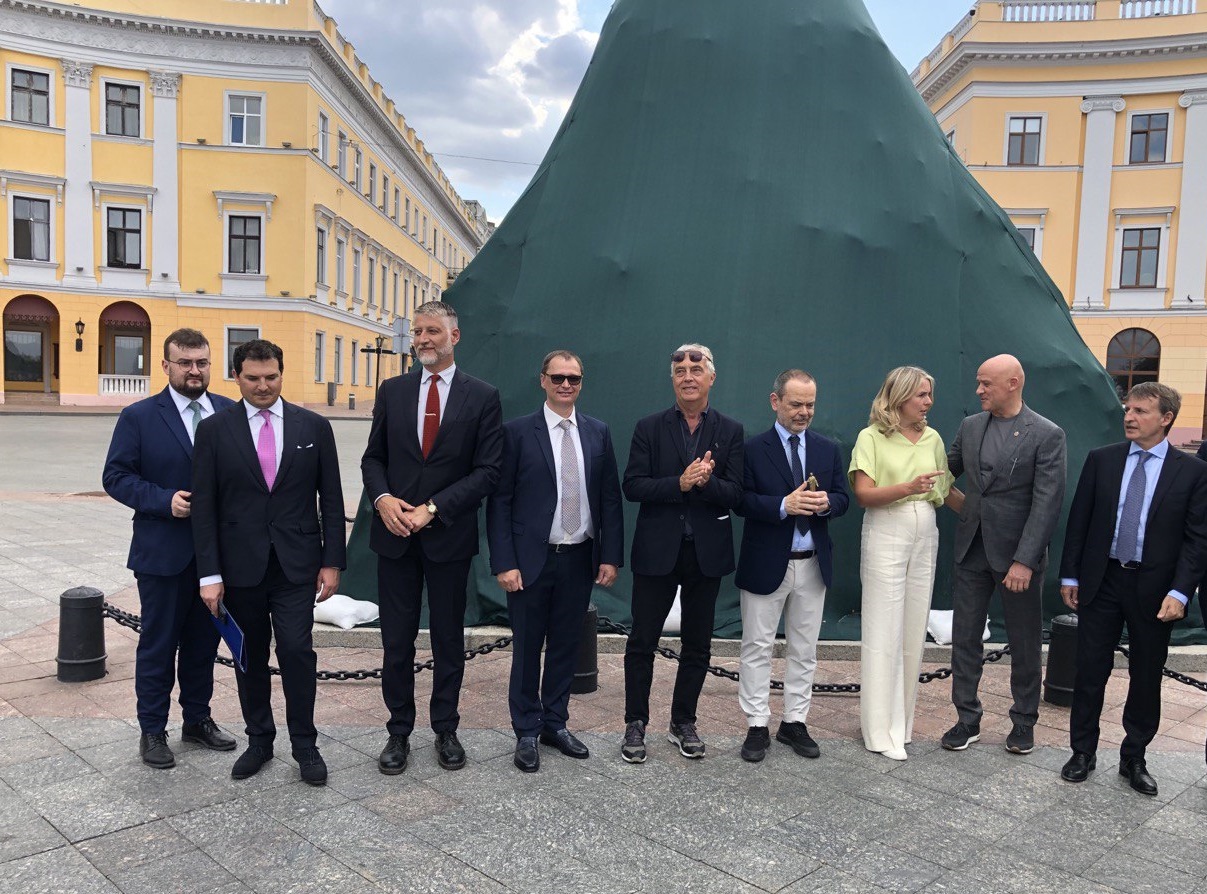The author of this article is the Italian writer Adriano Sofri and the piece was originally published on the Italian newspaper Il Foglio.
Odessa is the pearl, and the Russia of Putin, blinded by possession and jealousy, relentlessly targets it with bombings and hunger, making it more necessary than ever to handle it with delicacy. Odessa is not only beautiful, but it is devoted to beauty: the kind that might save the world, the kind that the world can save. Yesterday's reports mentioned two simultaneous events: the official inauguration of the Italian honorary consulate (the appointment dates back to April) and the visit of the Italian delegation tasked with the restoration of historical buildings and monuments, starting with the Orthodox cathedral (in allegiance to the Moscow Patriarchate!) gutted by a missile.
The first promising and remarkable detail is the Ukrainian name of the consul: Vladislav Shtamburg. He is 47 years old, hails from Dnipro, runs a food import-export business, has been involved in sports leadership and patronage – soccer and Paralympic equestrianism – and has three children. As the Italian ambassador, Pier Francesco Zazo, pointed out, he is "a great friend of Italy." Dnipro has stood out for the civic initiative of its successful forty-something entrepreneurs. Shtamburg's appointment confirms the "foreign papacy" atmosphere that Odessa exudes. Since May 30, it has a new governor, Oleg Kiper, 43 years old, formerly the head of the Kyiv Prosecutor's Office but born and raised in Odessa. The city also has a well-known and controversial mayor, since 2014, GennadyiTrukhanov, 58 years old, who also has ties to Italy and is currently out on bail amid corruption investigations.
The second event, the visit of the delegation, suggests that the Italian authorities are taking this matter seriously. The desire to bear the responsibility and honour of reconstructing Odessa – a sentiment strongly shared by Greece, which also has an illustrious city history – has received the joint support of Tajani for foreign affairs, Sangiuliano for culture, and Mantovano for the Prime Minister's office. Those directly involved include Stefano Boeri for Milan's Triennale and Alessandro Giuli for Rome's Maxxi, along with the reconstruction commissioner, Ambassador Davide La Cecilia, and the UNESCO director for Ukraine, Chiara Dezzi Bardeschi. The latter is a specialist in archaeological restoration with rich international experience, as seen in the case of the explosion in Beirut. She also carries a surname that her great father, Marco, 1934-2018, notably represented in the field of monument restoration.
Regarding the matter of delicacy – which these individuals certainly uphold – here is a small example. In the run-up to the vote on including Odessa (Odesa in Ukrainian spelling) in the endangered UNESCO heritage, the mayor, alongside the culture minister, vehemently denounced ICOMOS, the International Council on Monuments and Sites, which assesses UNESCO nominations and oversees conservation. "ICOMOS has politicized the Ukrainian dossier by including information about the founding of Odessa by the 'strategic decision of Empress Catherine II'... We cannot tolerate openly pro-Russian narratives in the document prepared by the World Heritage Centre regarding the Ukrainian candidacy...". The Italian section of ICOMOS had indeed been chaired by Marco Dezzi Bardeschi, and his daughter has succeeded him as vice-chair...
They, along with Ambassador Zazo, spent two days in Odessa, which for some, including Boeri himself, were their first, and they invariably act like a long-distance lover meeting in person, satiated with photographs, discovering it even more beautiful, albeit wounded and outraged. Boeri had the profoundly disturbing experience of Irpin. Odessa is a different story, of course, even though it openly displays "the paradox," as he calls it, of the targeted and exposed cathedral. He, too, often found himself recognising other cities, Nice for its grand tree-lined avenue, Vienna or Milan for the theatre and its continuous balconies..., and the old Stock Exchange turned into Francesco Boffo's City Hall, the new Stock Exchange transformed into Alexander Bernardazzi's Philharmonic, and the staircase – they saw it, indeed. (I wonder if they could ever free the wonderful circle of the port from the hideous bulk of the former Hotel Odessa: Ruskin and conservative restoration, yes, but there is a limit to everything).

The Italian delegation in Odessa: Damiano La Verde (Commercial Attaché at the Italian Embassy), Federico Nicolaci (Consul General at the Italian Embassy), Alessandro Giuli (President of MAXXI), Vladislav Shtamburg (Honorary Consul of Italy in Odessa), Stefano Boeri (President of Triennale), Davide La Cecilia (Ambassador head of Italy-Ukraine task force), Svitlana Sharapa Zazo (wife of the Ambassador of Italy), Gennady Trukhanov (Mayor of Odessa), Pier Francesco Zazo (Ambassador of Italy in Ukraine).
Above all, our Italians can make the most of the excellent yet underrated voluntary work of local scholars and curators. Dmitry Shamatazhi, 37 years old, and Alexander Levitsky, 33, began compiling an electronic catalog with visual information about old Odessa in the spring of 2008. Today, they have fully studied 3,000 houses, one by one: the entire city center and about half of the other old buildings, including Moldavanka and the remote outskirts. They have photographed every architectural detail, climbing to inaccessible places even for residents, on rooftops and in attics. Unfortunately, this knowledge has been useful to restorers multiple times: fires and collapses before the war, and now the onslaught of Russian missiles. They earned some money by organising guided tours courtyard by courtyard, which are Odessa's treasure troves. They showed citizens that studying urban development is not boring and is often more exciting than myths and legends. Since December 2019, Alexander has initiated the "Thousand Doors" project: he found specialists who started restoring entrance gates on building facades. Until last year, these gates were only restored by private individuals. On January 11, 2022, they signed a contract with the EU for 440,000 euros. During the war, the money went to the armed forces. But their knack for improvisation helped them continue during the war: to date, they have restored 17 gates. And preserved ancient paintings and signs that are revealed beneath the rough Soviet-era plaster. All without touching the city budget funds. Synergies await.





















